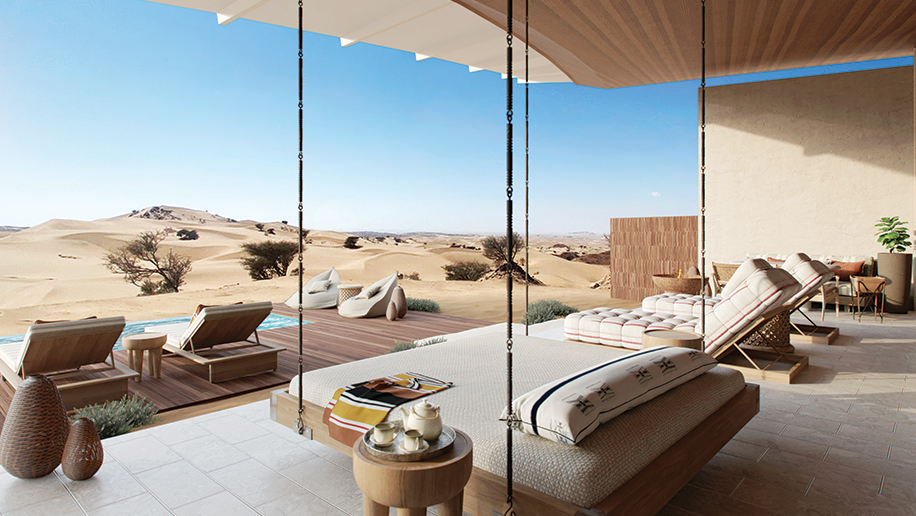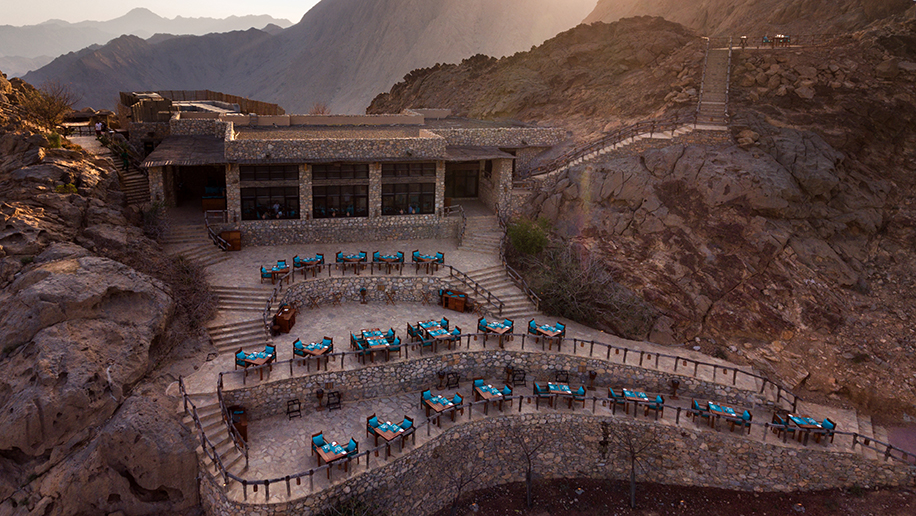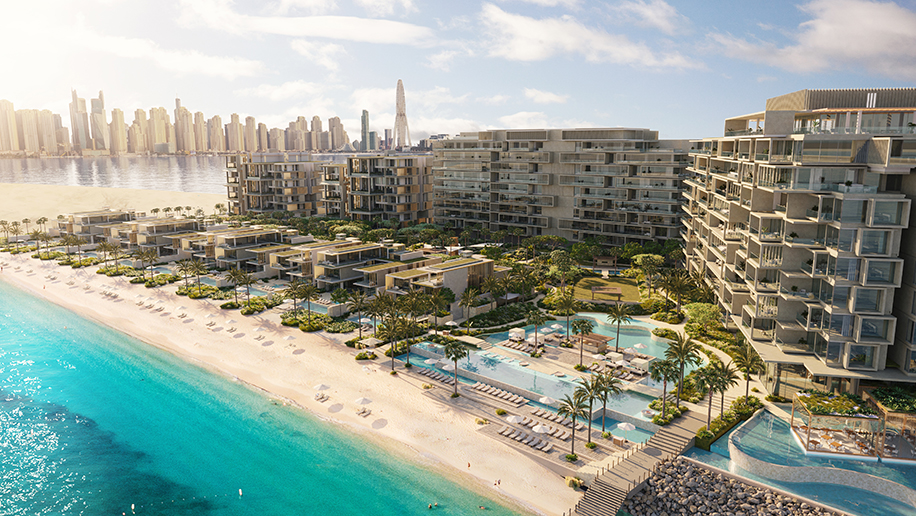
In 2019, the InterContinental Hotels Group (IHG) made a bold move when it acquired Six Senses Hotels Resorts Spas in a US$300 million cash deal. Six Senses joined IHG’s top-tier luxury brands including Regent, InterContinental Hotels and Resorts and Kimpton Hotels and Restaurants (which IHG acquired for US$430 million in 2014).
Four years after it was acquired, and the pandemic notwithstanding, Six Senses isn’t short on firepower. “We have a pipeline today of over 40 projects, of which around the low twenties are under construction, or in development. We will likely be close to 50 operating hotels within four years from now,” declares Neil Jacobs, chief executive officer of Six Senses Hotels Resorts Spas, in an exclusive interview with Business Traveller Middle East.
“The growth has been substantial, and also global. We started life very much as an Asian company, but that’s no longer the case.”
Today, Six Senses has approximately 23 operational properties and around 1,100 keys worldwide. And while it is well spread across a handful of key Asian and Pacific countries including Thailand, Vietnam, Fiji and Bhutan, Jacobs acknowledges that India, China and the Americas represent vast untapped potential for the brand. In India, the first Six Senses resort opened in Rajasthan in 2021. The Six Senses Fort Barwara is located close to the Ranthambore National Park and is a 48-suite resort. Six Senses Vana opened more recently in the Himalayas and is a wellness-focused retreat located close to Rishikesh which is where yoga originated. Jacobs explains that in India, there are several enquiries for new openings, but the brand is being deliberatively selective in its partners and who they do business with.
In the Americas, Six Senses doesn’t have any operational properties yet. In China, it currently has only one outpost – the Six Senses Qing Cheng Mountain – which was the first Six Senses non-beachfront property when it opened in 2015. But Jacobs outlines extensive plans for these two regions. “In China, we have other projects that we aren’t able to announce yet. In the Americas, other than one in Hudson Valley in upstate New York that was already announced, there are probably 10 projects that we’re looking at very closely. We are also opening next year in the Caribbean and will open in Grenada late this year or early next year. We have a project in Costa Rica, and we are starting construction in the Galapagos too,” says Jacobs.

Here in the Middle East, Six Senses is expected to become the first hotel to open within the mega Red Sea development in Saudi Arabia this year. The inland Six Senses Southern Dunes, The Red Sea property will feature 46 villas and a 36-key hotel. “We feel the pressure being the first one [to open in the Red Sea]. There’ll be a big lens looking at us. We’re hoping to open [Southern Dunes] in late summer this year. We also have a signed agreement for another hotel in Diriyah Gate,” says Jacobs in reference to the US$63.2 billion Diriyah mixed-use development which is under construction in Riyadh. “That hotel [in Diriyah] is probably two-and-a-half years away from completion. And we also have one more signed deal in Saudi Arabia, but we have not yet announced it.”
Elsewhere in the Middle East, Six Senses has a long-established presence in Oman having opened Six Senses Zighy Bay back in 2008. It has villas, suites and beachfront retreats, each with its own private pool, and Jacobs refers to it as one of Six Senses’ “legacy hotels that continue to do extremely well for us”.
Apart from building the Middle East as a prime destination market, Jacobs is also aware of its potential as a source market. As he points out, the Middle East is not currently one of its biggest source markets, but customers from this region are generally high spenders. “The Middle East, like India, is a growing source market for us. Travellers from both these markets operate at the very high end of the industry. They prefer the large suites and villas. They often travel in large groups – we can get bookings of up to 10 people, which include their entourage, nannies and helpers. And we’re therefore designing hotels now with much bigger units, and multi-bedroom accommodations as well.
“However, probably 65-70 per cent of our business comes from five major source markets: UK, France, Germany, US and China, but not necessarily in that order. China still has not recovered to where it was pre-Covid, but it will. The US goes between number two and three for us, but we think the US will ultimately be our number one market as we open properties there.”
A sixth sense
Five years ago, Six Senses decided to introduce the concept of an Earth Lab at each of its properties. These labs were meant to educate guests, and actively engage in wide-ranging issues including reducing consumption, encouraging local production and supporting nearby communities and ecosystems.
“We insist, contractually, that half a per cent of a property’s total revenue is committed to sustainable regenerative practices focused on communities outside of the hotel. So, it’s not just about spending on sustainability in the hotel, it’s about going outside of the hotel. It includes bringing access to clean water in Maldives or education in Thailand…we’re involved in all kinds of initiatives that are contextual to where the properties are located.”
Other initiatives include Six Senses Laamu protecting 115,000 sqm of seagrass meadows – the equivalent of 16 soccer fields – and creating a protected nesting site for endangered green sea turtles in the Maldives to allow the local marine ecosystem there to thrive. Six Senses Rome meanwhile renovated the façade of the adjacent San Marcello al Corso Church, while Six Senses Zighy Bay supports local women via the Dibba Women Association.
Six Senses said that in 2022, across its global properties, it provided enhanced access to education and skills training to 8,528 students and also created 113 jobs outside of its hotels within local communities.

Jacobs adds that sustainability is now no longer a nice-to-have component to a major hospitality brand’s operations, but an absolute necessity. “Our industry as a whole has, unfortunately, not been a leader in sustainable practices. The good news is that it’s changing. Our [building] standards are LEED Silver as a minimum. And if we don’t get that commitment from our owners and developers, we will not do a project.
“Every hotel has a sustainability director. That’s not the same as having a green team that meets once a month. This person touches every single department of the hotel and sits on the executive committee of the hotel. That just elevates the importance of the function within the organisation at the hotel level.”
One of the most ambitious targets that Six Senses had set for itself was to eliminate single-use plastic from its properties by the end of 2022. Jacobs explains that it has reached around 86-87 per cent of its plastic-free target, and that involved a mammoth effort in working internally on its operations, as well as with its external partners across its supply chain. Internally, it meant measures such as insisting that cooks don’t rely on sous vide preparation methods and use natural packaging solutions in the kitchen, while externally it meant programmes such as working with local fishermen who deliver the day’s daily catch to the hotel and insist that they no longer use plastic bags to transport their haul to the hotel. Instead, Six Sesnes decided to supply these fishermen with metal crates.
Turning a page
Apart from its resort offerings, an area that Six Senses is now focusing on is its branded residences. Its Six Senses Residences are available for purchase in several of its properties including Con Dao in Vietnam, Courchevel in France, Fiji, Seychelles, Ibiza and Türkiye, with planned offerings in Austria, Switzerland and London, among other locations.
An upcoming Six Senses property in Dubai located on the Palm Jumeirah will feature 61 hotel rooms and 162 branded residences. The residential offering there will include penthouses and duplex ‘sky villas’ too. Nine five-bedroom beachfront signature villas will each have their own infinity pool and private garden as well. “The reality is that one in two projects that we undertake these days has a branded residential component to it. Dubai has it, as does [the Six Senses property in] the Red Sea, among others. We feel a branded residential component allows us to really spread the word to a larger audience. The hotel helps the residences, and the residences help the hotel,” says Jacobs.
Building on the success of the Six Senses brand and expanding its ecosystem to non-hotel guests, Six Senses Place will serve as its club concept that is going to be rolled out in major global locations over the coming months. “We will be launching our club concept in London next year. In London, we have several residences, and the buyers will become members of the club – it is included in the price of their unit. We will also be doing a Six Senses Place in Dubai,” reveals Jacobs.

With Six Senses having opened two properties earlier this year, both in Europe, the next is going to be in the Red Sea development, besides the brand’s second opening in the Maldives, the Six Senses Kanuhura resort, which will likely open this September, and also its first property in London is scheduled for a 2023 debut. As Jacobs notes, Six Senses has ongoing projects in Mexico’s Yucatan Peninsula, Lisbon, Umbria, and Spain. Interestingly, Six Senses is working on three projects in Japan, with the first one slated to open in Kyoto. “We’re looking at every hotel, strategically and opportunistically, and every new hotel has to be as good as the rest in the portfolio – maybe even better – to ensure that we maintain brand integrity and don’t lose the plot as we grow,” says Jacobs. With the current state of affairs, he needn’t worry about that happening in the near term.












